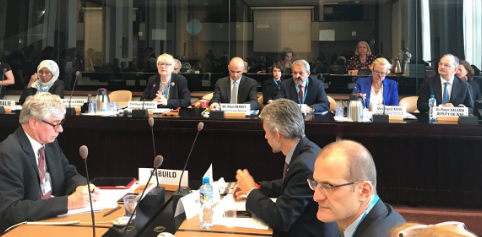UHC2030 hosted its annual UHC Day parliamentarian town hall to...
13 June 2018
Side event at the World Health Assembly 71, Geneva, Switzerland

On the first day of the World Health Assembly, the President of the Swiss Confederation, Mr Alain Berset, launched a process for a call to action on universal health coverage (UHC) in emergencies during the side event ‘A call to action: advancing UHC in emergency settings’.
WHA71 side event on UHC and emergencies meeting summary
WHA71 side event on UHC and emergencies report
The event was led by the Governments of Afghanistan and Switzerland, and co-sponsored by The Netherlands, Nigeria, Somalia, Canada, Guinea and Central African Republic. Other co-organisers included the World Health Organization (WHO), The World Bank Group (WBG), UHC2030, International Committee of the Red Cross (ICRC), International Federation of Red Cross and Red Crescent Societies (IFRC), ReBUILD Consortium and Chatham House.
UHC2030’s contribution to this event was also through the Technical Working Group (TWG) on support to countries with fragile or challenging operating environments, in support of our objectives to raise the profile of the agenda and provide a platform for partners to exchange and learn about what it means to advance towards UHC in fragile, conflict and crisis-affected settings.
President Berset acknowledged the urgent need to improve outcomes for populations left behind, and for compliance with the UN Security Council Resolution 2286 on attacks on health care, hence a call to action will help to rally and enhance political commitment. Minister Ferozuddin from Afghanistan spoke of the opportunity to lay sound foundations towards UHC despite prolonged conflict and emergencies.
Minister Kaag from the Netherlands emphasised the importance of rapid, continuous and quality services during conflict, noting the particular importance of sexual and reproductive health and rights, and mental health services – an “orphan” to date. She also echoed the call for compliance and accountability to Resolution 2286, on which there has been no meaningful implementation.
Minister Somse from the Central African Republic (CAR) said, “UHC is the incubator of peace building in crisis”, and presented CAR’s framework of one national health authority, one results-based national framework, and one M&E plan to promote alignment across stakeholders. Minister Nur, from Somalia, expressed her commitment to UHC, which must involve mutual accountability across partners. She raised challenges in Somalia of high out-of-pocket expenditures and health workforce distribution.
WHO’s Deputy Director General, Emergency Preparedness and Response, Dr Peter Salama, noted the following steps that can advance UHC in fragile settings: strong stewardship and leadership from the government, a comprehensive national health plan, an essential package of services, systems in place for the flow of commodities and finances, independent monitoring, and flexible donor support to enable multi-year planning.
Raising the importance of communities as first responders, Dr Emanuele Capobianco at IFRC called for a focus on the hardest to reach first. Dr Michele Gragnolati from the World Bank Group reconfirmed the WBG’s increasing commitments to fragile and conflict-affected countries under IDA18 with USD 33 billion of funds, and its consistent support to generate impact in Afghanistan and the Great Lake Region among others. The WBG has been supporting for health systems strengthening in pre-, during and post-crises in close collaboration with other partners, including the DARES collaboration and UHC2030.
Dr Tim Martineau, representing the ReBUILD consortium, shared findings from health systems research in post-conflict settings, including the need for systems thinking and coordination whilst responding to emergencies, and the need for evidence to drive action. Both speakers noted the need for multi-stakeholder collaboration on this agenda, giving credit to the UHC2030 Technical Working Group.
UHC2030 is ready to work with the Governments of Switzerland and Afghanistan to shape the call to action and mobilise multi-stakeholder support, so that emergency settings are not left behind in global efforts to advance UHC.
More UHC2030 News
A global health financing emergency threatens progress toward...
UHC2030 at HSR2024: Advancing equity and inclusion in health systems through civil society knowledge
UHC2030, in collaboration with the SUPPORT-SYSTEMS research...
